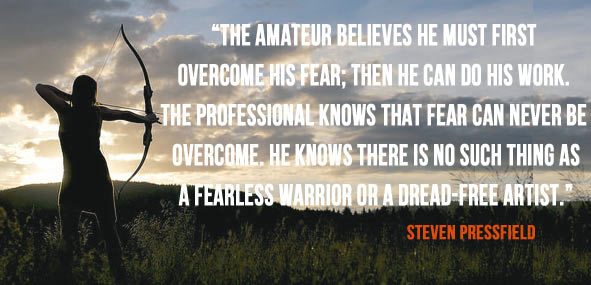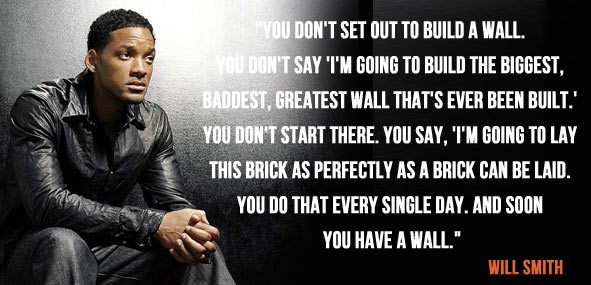Life
7 Ludicrous Lies You Keep Telling Yourself
There are so many lies that society ingrained inside of you, that you adopted as you own. From your parents to your teachers, these lies snuck into your life, without you even realizing it.
Now it’s time to uncover them to achieve the success you truly deserve.
Here are 7 ludicrous lies you tell yourself that keep you away from success.
1. I shouldn’t fail
The most successful people fail and they fail often. If you want to speed up your path to success, take goal-aligned actions that are above what you think you’re capable of every single day.
Failing involves trying and moving out of your comfort zone. If you avoid the risk of failing, you are setting yourself up for failure by default.
Remember:
“When we give ourselves permission to fail, we, at the same time, give ourselves permission to excel.” ~ Eloise Ristad
2. I shouldn’t be scared
We live in a society that tells us, “you must overcome your fears and radically eliminate them”. This makes us thrive towards an unrealistic state that we may never achieve.
Fear will only disappear when you do nothing, try nothing, be nothing.
It disappears when you stay within your comfort zone and avoid taking any kind of risks – but for that, you pay the price of a boring life.
The difference between those who succeed and those who don’t is not their degree of fear – but how they respond to it.
As Stephen Pressfield famously wrote in the ‘War of Art’:

(“The amateur believes he must first overcome his fear; then he can do his work. The professional knows that fear can never be overcome. He knows there is no such thing as a fearless warrior or a dread-free artist.” ~Steven Pressfield)
Accept your fears and use it as a catapult for progress by doing what needs to get done.
3. I should be able to do it alone
Successful people create an environment that supports their goals and surrounds themselves with the right people.
You don’t have to do it alone and find all the answers yourself. A friend of mine once said:
“The more you ask, the more you can get.”
If asking makes you feel uncomfortable, become a giver. A person that gives feels no discomfort in asking, they see it as a mutual exchange of love.
“The strong individual is the one who asks for help when he needs it. ~ Rona Barret (Retweet this)
4. My circumstances are my problem
People view the problems that they encounter external to themselves. They blame others for what is happening or not happening. They blame the economy, the environment or anything else they can find.
Life is a projection and your problems are mere delusions of your thinking. In the philosopher’s notes on ‘Love what is’ by Byron Katie, there is a great little story that goes like this:
Imagine you’re in the cinema watching a movie. When the movie starts, you notice some smudge on the screen. So, you get up and try to wipe it off – but it doesn’t go away. You try harder and harder, but nothing changes. You get frustrated and annoyed and can’t enjoy the movie anymore.
The problem was never the screen but rather the projector that had smudge on its lens. Your mind is the projector and your life the movie screen. If you see smudge on the screen , you don’t need to wipe down the screen – but the projector that projects it.
Don’t go through life thinking you need to change the “movie screen” – your life – instead change the projector by changing the way you think.
5. I shouldn’t struggle
Your struggles are not your problem – your response to them is. Some say the word struggle derived from Proto-Germanic “strūkōną” – “to be stiff”. When you struggle, you don’t flow with life, accept, and embrace life as it comes.
What if you see your struggles as gifts that give you the optimal opportunities to grow, develop and mature? Eliminate the idea of struggles and problems: Life either presents itself as “blissful experiences or as blissful opportunities to learn”.
“Education comes from within; you get it by struggle and effort and thought.“ ~ Napoleon Hill
6. I just need to fix my weaknesses
Your areas of strength offer the biggest room for personal growth. Instead of wasting your time fixing weaknesses, going from terrible to mediocre, spend your time and energy to develop excellence. This can only be achieved by focusing on your natural talents and developing them into strengths.
Successful people are not well-rounded,instead they capitalize on their strengths and manage around their weaknesses. By fixing your weaknesses, you ultimately aim for average. It’s not the path to glory.
Play to win instead of play not to lose.
“Emphasize strengths, don’t fix weaknesses.” ~ Tim Ferriss
7. I need to have the end in mind
Stephen Covey talked about beginning with the end in mind, having a clear focus on where you are heading. But constant thinking about your goals means being mentally in the future, disengaged from the current moment.
Being mindfully present in the now with focused attention on the task, is the key ingredient for high performance.
In his book ‘Overachievement’, psychologist John Eliot explains that overachievers act in the “trusting mindset”, being total engaged in what they are doing, without thought.
To live your best life, be present and mentally engaged in the now. Success starts in this very moment, with the choices you make right now.
Yes, keep the end in my mind. Plan, dream and visualize – but have the “present moment” more present in mind. Will Smith was right when he said:

Which lie are you telling yourself? Let me know in the comments below!
Did You Know
How Skilled Migrants Are Building Successful Careers After Moving Countries
Behind every successful skilled migrant career is a mix of resilience, strategy, and navigating systems built for locals.

Moving to a new country for work is exciting, but it can also be unnerving. Skilled migrants leave behind familiar systems, networks, and support to pursue better job opportunities and a better future for their families. (more…)
Life
10 Research-Backed Steps to Create Real Change This New Year
This New Year could finally be the one where you break old patterns and create real, lasting change.

Every New Year, we make plans and set goals, but often repeat old patterns. (more…)
Life
9 Harsh Truths Every Young Man Must Face to Succeed in the Modern World
Before chasing success, every young man needs to face these 9 brutal realities shaping masculinity in the modern world.

Many young men today quietly battle depression, loneliness, and a sense of confusion about who they’re meant to be.
Some blame the lack of deep friendships or romantic relationships. Others feel lost in a digital world that often labels traditional masculinity as “toxic.”
But the truth is this: becoming a man in the modern age takes more than just surviving. It takes resilience, direction, and a willingness to grow even when no one’s watching.
Success doesn’t arrive by accident or luck. It’s built on discipline, sacrifice, and consistency.
Here are 9 harsh truths every young man should know if he wants to thrive, not just survive, in the digital age.
1. Never Use Your Illness as an Excuse
As Dr. Jordan B. Peterson often says, successful people don’t complain; they act.
Your illness, hardship, or struggle shouldn’t define your limits; it should define your motivation. Rest when you must, but always get back up and keep building your dreams. Motivation doesn’t appear magically. It comes after you take action.
Here are five key lessons I’ve learned from Dr. Peterson:
-
Learn to write clearly; clarity of thought makes you dangerous.
-
Read quality literature in your free time.
-
Nurture a strong relationship with your family.
-
Share your ideas publicly; your voice matters.
-
Become a “monster”, powerful, but disciplined enough to control it.
The best leaders and thinkers are grounded. They welcome criticism, adapt quickly, and keep moving forward no matter what.
2. You Can’t Please Everyone And That’s Okay
You don’t need a crowd of people to feel fulfilled. You need a few friends who genuinely accept you for who you are.
If your circle doesn’t bring out your best, it’s okay to walk away. Solitude can be a powerful teacher. It gives you space to understand what you truly want from life. Remember, successful men aren’t people-pleasers; they’re purpose-driven.
3. You Can Control the Process, Not the Outcome
Especially in creative work, writing, business, or content creation, you control effort, not results.
You might publish two articles a day, but you can’t dictate which one will go viral. Focus on mastery, not metrics. Many great writers toiled for years in obscurity before anyone noticed them. Rejection, criticism, and indifference are all part of the path.
The best creators focus on storytelling, not applause.
4. Rejection Is Never Personal
Rejection doesn’t mean you’re unworthy. It simply means your offer, idea, or timing didn’t align.
Every successful person has faced rejection repeatedly. What separates them is persistence and perspective. They see rejection as feedback, not failure. The faster you learn that truth, the faster you’ll grow.
5. Women Value Comfort and Security
Understanding women requires maturity and empathy.
Through books, lectures, and personal growth, I’ve learned that most women desire a man who is grounded, intelligent, confident, emotionally stable, and consistent. Some want humor, others intellect, but nearly all want to feel safe and supported.
Instead of chasing attention, work on self-improvement. Build competence and confidence, and the rest will follow naturally.
6. There’s No Such Thing as Failure, Only Lessons
A powerful lesson from Neuro-Linguistic Programming: failure only exists when you stop trying.
Every mistake brings data. Every setback builds wisdom. The most successful men aren’t fearless. They’ve simply learned to act despite fear.
Be proud of your scars. They’re proof you were brave enough to try.
7. Public Speaking Is an Art Form
Public speaking is one of the most valuable and underrated skills a man can master.
It’s not about perfection; it’s about connection. The best speakers tell stories, inspire confidence, and make people feel seen. They research deeply, speak honestly, and practice relentlessly.
If you can speak well, you can lead, sell, teach, and inspire. Start small, practice at work, in class, or even in front of a mirror, and watch your confidence skyrocket.
8. Teaching Is Leadership in Disguise
Great teachers are not just knowledgeable. They’re brave, compassionate, and disciplined.
Teaching forces you to articulate what you know, and in doing so, you master it at a deeper level. Whether you’re mentoring a peer, leading a team, or sharing insights online, teaching refines your purpose.
Lifelong learners become lifelong leaders.
9. Study Human Nature to Achieve Your Dreams
One of the toughest lessons to accept: most people are self-interested.
That’s not cynicism, it’s human nature. Understanding this helps you navigate relationships, business, and communication more effectively.
Everyone has a darker side, but successful people learn to channel theirs productively into discipline, creativity, and drive.
Psychology isn’t just theory; it’s a toolkit. Learn how people think, act, and decide, and you’ll know how to lead them, influence them, and even understand yourself better.
Final Thoughts
The digital age offers endless opportunities, but only to those who are willing to take responsibility, confront discomfort, and keep improving.
Becoming a man today means embracing the hard truths most avoid.
Because at the end of the day, success isn’t about luck. It’s about who you become when life tests you the most.
Change Your Mindset
The Four Types of Happiness: Which One Are You Living In?
Most people chase success only to find emptiness, this model reveals why true happiness lies somewhere else.

In a world driven by rapid technological growth and constant competition, many people unknowingly trade joy for achievement. (more…)
-

 News2 weeks ago
News2 weeks agoBrandon Willington Builds 7-Figure Business by Ignoring Almost Everything
-

 Health & Fitness2 weeks ago
Health & Fitness2 weeks agoWhat Minimalism Actually Means for Your Wellness Choices
-

 Did You Know2 weeks ago
Did You Know2 weeks agoWhy Most Online Courses Fail and How to Fix Them
-

 Business2 weeks ago
Business2 weeks agoIf Your Business Internet Keeps Letting You Down, Read This
-

 Business4 days ago
Business4 days agoEntrepreneur’s Guide to Pay Stubs: Why Freelancers and Small Business Owners Need a Smart Generator
-

 Business2 days ago
Business2 days agoThe Simple Security Stack Every Online Business Needs
-

 Finances2 days ago
Finances2 days agoWhy Financial Stress Is One of the Biggest Barriers to Personal Growth
-

 Scale Your Business2 days ago
Scale Your Business2 days ago5 Real Ways to Grow Your User Base Fast


























15 Comments